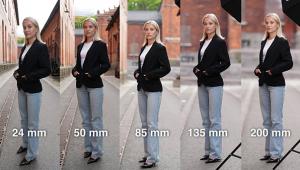Help!
Here is a quick tip list on letters for the HELP! desk:
Please confine yourself to only one question per letter. Both postal letters
and e-mails are fine, although we prefer e-mail as the most efficient form of
communication. Send your e-mail queries to editorial@shutterbug.com
with Help in the subject header and your return e-mail address at the end of
your message. Although we make every effort, we cannot promise to answer every
HELP! letter.
When sending a response or suggestion that refers to a published letter please
include the month and page of the original question.
All postal letters to HELP! must be accompanied by a stamped, self-addressed
envelope to be considered for reply. We will respond to e-mail queries with
an e-mail.
Get A Grip
Q. I recently acquired a Panasonic Lumix DMC-L1 camera. It has a Leica D VARIO-ELMARIT
14-50mm zoom lens. I'm very pleased with the performance of the lens and
the computer technology in the camera. But, because of the weight of the lens
and the short height of the camera body, the ergonomics of the camera for handheld
photography are not very good. If a grip could be attached to the base of the
camera, extending the height of the camera a few inches, providing the needed
stability for the right hand, and dramatically improving the ergonomics of the
camera, the camera would be an excellent tool for handheld photography. Many
of the best-known professional cameras provide a power grip that improves the
ergonomics of the camera in addition to supplying additional power. Both my
Canon F1 and Contax N1 have such grips. The grip for the Lumix DMC-L1 does not
need to supply power to the camera. It simply needs to screw into the base of
the camera to provide the ergonomic stability that the camera needs. Do you
know of any company, or enterprising technician, that offers such a grip for
the Lumix DMC-L1 or any company, or enterprising technician, that is willing
and able to construct such a grip?
Wilbert "Skip" Norman, PhD
via e-mail
A. A simple attachment below the camera or a bracket that rises up on the left side of the camera might offer the added extra support area you seek. For instance, Kirk offers a Super Grip Mount, an elongated flattened circle, that's used with an Arca-style quick-release plate attached to the tripod socket to provide an enclosed handle having rubber padded areas inside and outside for protection. Kirk also makes a variety of helpful accessories and they might be able to make a custom grip for the base of your camera. In addition, there are some rather simple (L) shaped camera side grips available that attach via the camera tripod socket that raise up on the left end of the camera. These are intended to hold a shoe-mount flash for cameras without a hot shoe. They have a wider grip area, sometimes with indentations to offer finger grip areas, which should assist in balancing your camera when it's handheld. This type of bracket is offered under the Kalt brand by BKA. A somewhat similar version is available from OmegaSatter under the Tundra name. Custom Brackets offers a palm grip accessory for some of their side flash brackets that might be adaptable to your needs. You can obtain further data from these firms on these items and see pictures of them at their websites or by contacting them at the following addresses: Brandess-Kalt-Aetna Group, Inc. (701 Corporate Woods Pkwy, Vernon Hills, IL 60061; (847) 821-0450; www.bkaphoto.com), Custom Brackets (32 Alpha Park, Cleveland, OH 44143; (800) 530-2289; www.custombrackets.com), Kirk Enterprises (333 Hoosier Dr., Angola, IN 46703; (800) 626-5074; www.kirkphoto.com), and OmegaSatter (1041 S. Carroll St., Hampstead, MD 21074; (410) 374-3250; www.omegasatter.com).
Mamiya & Polaroid 600 SE
Q. I enjoyed your article on the Mamiya Press box camera (February 2008 issue).
I have a box camera with the same three lenses you depicted, only it is a Polaroid
camera model 600 SE. My question: do you know if a 120/220 film back can be
purchased for this camera? If so, where?
Frank Teachman
via e-mail
A. I dug out some old Polaroid historical brochures and found the Polaroid Model 600 Land camera was introduced in 1978 with a fixed 127mm lens, and then later the Model 600 SE version came along accepting three interchangeable lenses, a 75mm, 127mm, and 150mm. Although it does accept interchangeable film holders having dark slides, no 120/220 rollfilm holders were offered by Polaroid. Polaroid marketed this camera (which was actually made by Mamiya and nearly identical to the Mamiya Press cameras of that era) so they only offered holders that accepted Polaroid pack films. I believe the back coupling mechanism was slightly different so it would not accept Mamiya Press camera backs, and there was no rollfilm back offered. I called the Polaroid toll free hot line (800-343-5000) and they verified this fact. Possibly some other firm offered a rollfilm back that could be used, but evidentially Polaroid never did.
Filters For Chromogenic?
Q. Traditional black and white films such as Tri-X and HP5 often benefited from
the use of yellow, orange, or red filters on the camera lens to reduce the amount
of blue light reaching the film and to improve contrast. Are such filters needed
for a C-41 process black and white film such as Ilford's XP2 or Kodak's
BW400CN?
Fred Huff
Barboursville, WV
A. I checked the Kodak website (www.kodak.com) and looked up the specifications for Kodak Professional BW400CN film. There it says you can use filters just the same as when using filters with conventional (non-chromogenic) black and white films. I'm sure the Ilford XP2 film can be used in a similar way. Evidentially the fact that these are basically color negative films, which are processed in C-41 color negative chemicals, has no bearing on the use of filters.

































